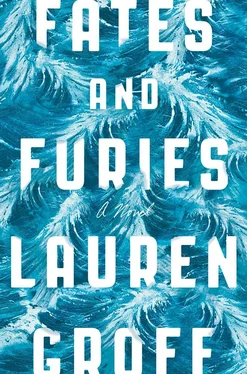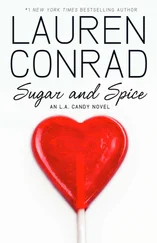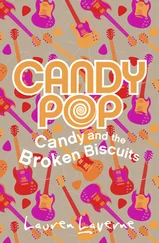In the scene where Manfred died, Lotto’s face was slick and shining. Sweat, not tears, at least she believed. Hard to tell. [Tears.]
There were standing ovations, eight of them, the performers coming back again and again and again, not merely because of the audience’s great love for Lotto, but because the play came together, like magic, congealed at the moment of airing. And when Lotto walked out from the wings, the roar from the audience could be heard in the little bar up the block, to which the friends who had been begged to attend and who had arrived to find the show sold-out had decamped to start their own impromptu party.
The glow lasted through the night, beyond the bar’s closing, when there were no cabs on the street, and so Mathilde and Lotto decided to walk home, her arm in his, chatting about nothing, about everything, the unpleasant hot breath of the subway belching up from the grates. “Chthonic,” he said, booze letting loose the pretension at his core, which she still found sweet, an allowance for the glory. It was so late there were few other people out, and it felt, just for this moment, that they had the city to themselves.
She thought of all the life just underfoot, the teem of it that they were passing over, unknowing. She said, “Did you know that the total weight of all the ants on earth is the same as the total weight of all the humans on earth?”
She, who never drank to excess, was a little bit drunk, it was true; there was so much relief in the evening. When the curtains closed against the backdrop, an enormous boulder blocking their future had rolled itself away.
“They’ll still be here when we’re gone,” he said. He was drinking from a flask. By the time they were home, he’d be sozzled. “The ants and the jellyfish and the cockroaches. They will be the kings of the earth.” He was amused by her; he, who was so often drunk. His poor liver. She pictured it inside him, a singed rat, pink and scarred.
“They deserve this place more than we do,” she said. “We’ve been reckless with our gifts.”
He smiled and looked up. There were no stars; there was too much smog for them. “Did you know,” he said, “they found out just a little while ago that there are billions of worlds that can support life in our galaxy alone.” He did his best Carl Sagan: “Billions and billions!”
She felt a sting behind her eyes, but couldn’t say why this thought touched her.
He saw clear through and understood. [He knew her; the things he didn’t know about her would sink an ocean liner; he knew her.] “We’re lonely down here,” he said. “It’s true. But we’re not alone.”
—
IN THE HAZY SPACE after he died, when she lived in a sort of timeless underground grief, she saw on the Internet a video about what would happen to our galaxy in billions of years. We are in an immensely slow tango with the Andromeda galaxy, both galaxies shaped as spirals with outstretched arms, and we are moving toward each other like spinning bodies. The galaxies will gain speed as they near, casting off blue sparks, new stars, until they spin past each other. And then the long arms of both galaxies will reach longingly out and grasp hands at the last moment, and they will come spinning back in the opposite direction, their legs entwined but never hitting, until the second swirl becomes a clutch, a dip, a kiss. And then, at the very center of things, when they are at their closest, there will open a supermassive black hole.
—
THE NEXT MORNING, after the glorious first night, when everything was good and the light was sweet and possible, she went out for the paper and a whole box of patisserie, pains au chocolat and chaussons aux pommes and croissants, and ate a brilliant almond viennoiserie in four bites as she walked back. Once home in their cozy gold-ceilinged burrow, she poured a glass of water while Lotto rifled through the paper with his hair a bed-head wilderness, and when she turned back around, his great lovely face had blanched. He made a curious grimace, drawing down his lower lip until he showed his bottom teeth, for once, perhaps the first time ever, wordless.
“Uh-oh,” she said, and came swiftly to him and read over his shoulder.
When she was finished, she said, “That critic can eat a bowl of dicks.”
“Language, love,” he said, but it came out automatically.
“No, seriously,” Mathilde said. “Whatsername, Phoebe Delmar. She hates everything. She hated Stoppard’s last play. She called it self-indulgent. She actually said that Suzan-Lori Parks was failing at being Chekhovian, which is insane because of course Suzan-Lori Parks isn’t trying to be Chekhov, duh. It’s hard enough to be Suzan-Lori Parks. That’s like the simplest criterion for being a critic, right, evaluating a work on its own terms. She’s like a bitch-face failed poet who knows nothing and is trying to make a name for herself by tearing people down. She only does pans. Don’t even pay any attention at all.”
“Yeah,” he said, but too softly. He stood and turned around haplessly for a moment like a great tall dog about to sink down into the grass for a nap, then went to the bedroom and crawled under his covers and stayed there, unresponsive, even though Mathilde crept naked into the room on her hands and knees, and dug the sheet out from under the mattress and slithered up the length of his body from the toes up, her head popping out of the duvet at his neck; but his body was lax and his eyes were closed and he wouldn’t respond, and even when she placed both of his hands on her bum, they slid off bonelessly in his misery.
Nuclear option it was, then. She laughed to herself; oh, she loved this hapless man. Mathilde went into the garden, overgrown now that poor Bette had passed away, and made a few phone calls, and at four in the afternoon, Chollie rang the doorbell with Danica on his arm—“Kiss kiss,” Danica shouted in each of Mathilde’s ears, and then, “Fuck you, I hate you, you’re so pretty”—and Rachel and Elizabeth came in, hand in hand, sporting matching tattoos of turnips on their wrists, the meaning of which they gigglingly refused to divulge, and Arnie came and made sloe gin fizzes, and Samuel came in wearing his baby on his chest. When Mathilde succeeded in putting Lotto in a nice blue button-up and khakis, and dragged him out to his friends, and with every hug, every person who came up and told him earnestly how wonderful the play was, she saw an inch of spine returning to him; she saw the color coming back to his face. The man swallowed praise the way runners swallow electrolytes.
By the time the pizza came, Mathilde opened the door, and though she was in leggings and a semitransparent top, the delivery man’s eyes were sucked to Lotto in the middle of the room, turning his arms into monster arms and bugging his eyes, telling a story of when he was mugged in the subway, pistol-whipped on the back of the head. He was emitting his usual light. He mimed a stagger then fell to his knees, and the pizza man leaned in to watch, ignoring the cash Mathilde was trying to hand him.
When she closed the door, Chollie was standing at her side. “Pig to man in a single hour,” he said. “You’re a reverse Circe.”
She laughed silently; he’d pronounced it Chir-chee , as if Circe had been a modern Italian. “Oh, you dirty autodidact,” she said. “It’s pronounced Ser-see .”
He looked wounded, but shrugged and said, “I never thought I’d say it, but you’re good for him. Well, hell!” he said, now in a vicious Florida accent. “Empty-head friendless blond model gold digger actually turning out good. Who’d a thunk? At first, I done figgered you was going to take the money and run. But no. Lotto got hisself lucky.” In his normal voice, Chollie said, “If he turns out to do something big with himself, it’ll be because of you.”
Читать дальше












